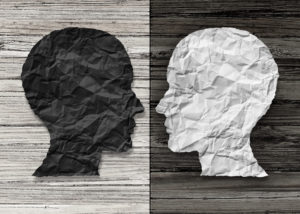“Genes don’t operate themselves,” said Dr. C. Robert Cloninger. “They function in concert much like an orchestra, and to understand how they’re working, you have to know just who the members of the orchestra are and how they interact,” he said.
Cloninger is a senior author on a recent study conducted by Washington University in St. Louis. The study unveiled that schizophrenia, a severe mental health condition that often leaves its victims hearing voices, thinking others can read their minds, and more, is actually a combination of eight different disorders. It is reported that 1.1% of the American public struggles with this disorder (National Institute of Mental Health).
The study was conducted by researching the genetics of people who have schizophrenia. The researchers recorded down gene variations in the subjects, and by doing so, were able to see that there are different “gene clusters” – a number of them – that can trigger eight different classes of schizophrenia.
While the discovery is groundbreaking, it is not all-too-shocking, as schizophrenia has long been known as one of the most complex disorders known to mankind.
How Can Schizophrenia Impact Addictive Behavior?
Approximately 50% of people who are struggling with a chemical dependency problem are also dealing with a mental health condition. Those who have schizophrenia are no different, as the effects of the disorder in itself can lead to a stronger likelihood of developing addictive behavior, and in-turn, a chemical dependency problem.
For example, a number of symptoms related to schizophrenia are often considered triggers for substance abuse. Some of these symptoms can include:
- Delusions and hallucinations
- Disorganized thinking (being unable to communicate thoughts clearly)
- Being less productive
- Lacking emotion
All of these symptoms can lead to bigger problems for an individual, such as issues at work, home and with personal relationships. In addition, the constant presence of hallucinations and delusions can be so upsetting and realistic that an individual is likely to want to escape those feelings (many times through substance abuse).
While we continue to learn about schizophrenia, we can understand just how important treatment for this mental health condition (plus others) can be in the prevention of addiction development. Through early diagnosis, a proper treatment plan, and support from family and friends, those who are battling with schizophrenia can learn how to cope with it in ways that do not include chemical dependency or other negative methods.
Author
-

President, CEO & Founder at Northbound Treatment Network
Paul Alexander is the CEO, President & Founder of Northbound Treatment Network in Newport Beach, California. He believes wholeheartedly in transformational leadership, organizational health and effective, fully integrated substance use disorder and mental health treatment. With over 27 years of experience in behavioral healthcare, Paul has extensive knowledge of “in vivo” treatment modalities, clinical development, operations, strategy, marketing and financial planning. He has been widely recognized for his development of collegiate-based residential treatment programs for students in recovery and authored a research study at The University of California confirming this modality’s effectiveness.
Paul’s comprehensive professional experience, willingness to innovate, and emphasis on organizational health are vital factors in Northbound’s continued success. Paul received his Certified Addiction Treatment Specialist training at Saddleback College in Mission Viejo, CA, and was awarded Outstanding Alumni Service Award in 2002. Paul holds a Bachelor of Arts degree in Criminology, Law and Society, Summa Cum Laude, from University of California, Irvine, and a Juris Doctorate degree from Loyola Law School of Los Angeles. Paul currently serves on The National Association of Addiction Treatment Providers (NAATP) board. In addition, he serves on The Family Recovery Foundation board and The CarePossible board in Orange County; both organizations are committed to raising funds for family recovery and treatment for former military personnel. Paul is in recovery himself and lives in Orange County with his wife Silvana and his two young sons, Noah and Dean.










